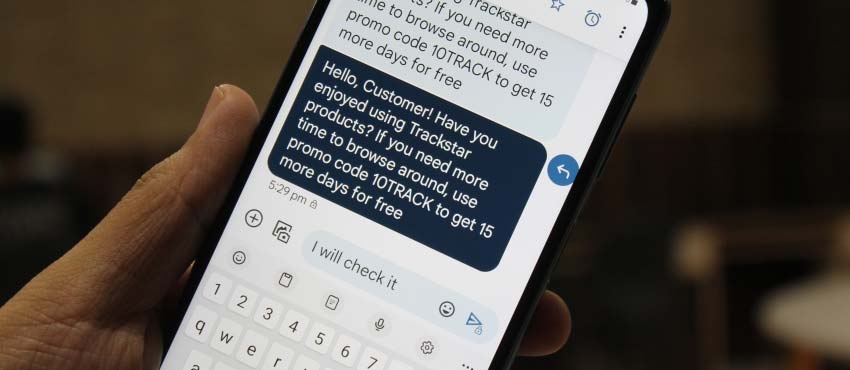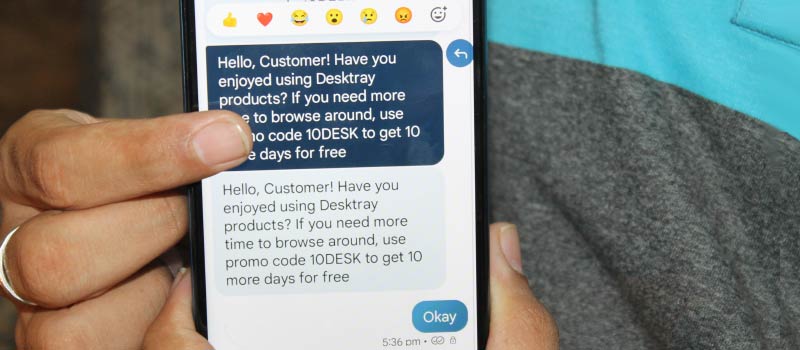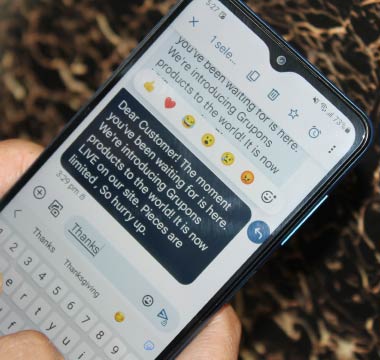Here are the main components that contribute to the cost of running a Bulk SMS marketing campaign:

-
SMS Credits:
The primary cost in Bulk SMS marketing is purchasing SMS credits or units from the SMS service provider. SMS credits represent the number of messages you can send. Providers usually offer different pricing tiers based on the volume of credits you buy. The more credits you purchase, the lower the cost per message. Some providers may also offer volume discounts for large-scale campaigns.
-
Message Type:
The type of message you send can affect the cost. Promotional messages, which are used for marketing purposes, may have different pricing than transactional messages, which are used for important alerts and notifications. Transactional messages often have higher priority and are generally more expensive.
-
Additional Features:
Some Bulk SMS platforms offer additional features or add-ons that come with extra costs. These features can include personalization options, delivery reports, analytics, link shortening, scheduling, and automation.
-
Opt-Out Mechanism:
To comply with regulations, you need to include an opt-out mechanism that allows recipients to unsubscribe from your messages. Some providers may charge extra for setting up and managing this feature.
-
Message Length:
SMS messages have a character limit (typically 160 characters per message). If your message exceeds this limit, it may be split into multiple messages, and you'll be charged accordingly for each part.
-
Integration and API Costs:
If you require integration with your existing systems or access to the provider's API for automation and seamless communication with your application, there may be associated costs.
-
Maintenance and Support:
Depending on the complexity of your requirements and the level of support needed, there might be ongoing maintenance and support fees.
-
Sender ID:
If you want to display a custom sender ID (e.g., your company name) instead of a random phone number, there might be additional costs for this service. Some providers offer free or paid options for sender ID customization.
-
International Messaging:
If your campaign targets recipients in different countries, international messaging rates may apply, and these rates can vary depending on the destination country.
Ensure that Your SMS Messages are Delivered Successfully in Bulk SMS Marketing
Ensuring successful delivery of SMS messages in Bulk SMS marketing is essential to the effectiveness of your campaigns. Here are some key strategies to help maximize the delivery success rate of your SMS messages:

-
Choose a Reliable Bulk SMS Provider: Select a reputable and reliable Bulk SMS service provider. Research and choose a provider with a good track record of delivering messages promptly and reliably. Look for providers with strong network connections and delivery infrastructure.
-
Avoid Spam Triggers: Craft SMS messages that are not likely to trigger spam filters. Avoid using excessive capitalization, too many exclamation marks, or spammy keywords. Stay away from language that could be seen as misleading or deceptive.
-
Sender ID Configuration: Configure an appropriate and recognizable sender ID for your messages. A sender ID is the name or phone number that appears as the sender of the SMS. A clear and trusted sender ID increases the chances of messages being delivered and read.
-
Optimal Timing: Send your SMS messages at times when recipients are likely to be attentive and responsive. Avoid sending messages during late hours or very early in the morning.
-
Clean and Updated Contact List: Regularly clean and update your contact list to remove invalid or inactive phone numbers. This helps reduce the number of undeliverable messages and improves your overall delivery rate.
-
Verify and Format Numbers Correctly: Ensure that all phone numbers in your contact list are correctly formatted, including the country code and area code. Incorrectly formatted numbers can lead to message delivery failures.
-
Maintain Good Sender Reputation: Maintain a good sender reputation by delivering valuable and relevant content. High opt-out rates and frequent complaints can harm your sender reputation and affect delivery rates.
-
Keep Your Database Secure: Protect your customer database from security breaches and unauthorized access. Ensure that your Bulk SMS provider has robust security measures in place to safeguard customer data.
-
Monitor Delivery Reports: Use the delivery reports provided by your Bulk SMS provider to monitor the status of your messages. Delivery reports indicate the delivery status of each message (e.g., delivered, failed, or pending).
-
Test Messages Before Sending: Always send test messages to yourself and colleagues before launching a campaign. This allows you to check message formatting, sender ID, and delivery speed.
-
Avoid Overloading: Do not overload the Bulk SMS gateway with too many simultaneous messages. This can result in delays or delivery failures. Instead, schedule messages in batches to ensure successful delivery.
-
Optimize for Different Carriers: Different mobile carriers may have varying delivery mechanisms and policies. Optimize your messages to ensure compatibility across various carriers.
-
Compliance with Regulations: Adhere to SMS marketing regulations and obtain proper consent from recipients. Non-compliance with regulations can result in delivery issues and legal problems.
By following these best practices and strategies, you can increase the likelihood of successful SMS message delivery in your Bulk SMS marketing campaigns. Regularly analyze your delivery reports and metrics to identify any potential issues and make necessary adjustments to improve the overall delivery success rate. This way, you can ensure that your messages reach your intended recipients in a timely and effective manner.
